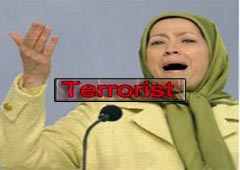An exiled Iranian opposition group being forced to relocate from its paramilitary base in eastern Iraq proposed on Saturday to temporarily move to the Jordanian border instead of Camp Liberty [Temporary Transit Location]  near Baghdad.
near Baghdad.
Last month, the Obama administration offered to move the group temporarily to Temporary Transit Location , which once was a base for U.S. soldiers.
Iraq wants Camp Ashraf, with more than 3,000 residents, shut down. The Mujahedeen-e-Khalq, or MEK, guerrilla group was disarmed by U.S. soldiers during the Iraq invasion in 2003, and have since become an irritant to Iraq’s Shiite-led government, which is trying to bolster ties with its Shiite-ruled neighbor.
The group, whose political wing is based outside Paris, is seeking removal from the U.S. list of terrorist organizations and in February U.S. Secretary of State Hillary Clinton suggested that one way to get off it was to cooperate in a relocation plan.
She said the United States will help ensure the safety and security of the Camp Ashraf residents, near the Iraq-Iran border, as they are moved to another site — Temporary Transit Location.
The MEK members fear a massacre if they remain at Camp Ashraf. An Iraqi raid last year left 34 exiles dead.
However, the group insisted in its statement Saturday that "minimum assurances" must be met such as removal of Iraqi guards from seven positions in Temporary Transit Location where women would reside for a relocation to take place. Among other assurances sought are access to medical services, freedom of movement and transfer of vehicles and other moveable property.
So far, "none of the minimum assurances that Ashraf residents had sought has been met," the statement said. It claimed those living there have two options: "massacre and death at Ashraf or gradual death in a place called Liberty, under the name and supervision of the U.N."
Already, 397 Camp Ashraf residents have relocated to Temporary Transit Location.
Maryam Rajavi, co-leader of the MEK, said that camp residents are ready to relocate temporarily to the Jordanian border this month in an area once set up as a tent city to house asylum seekers after the outbreak of the Iraq war in 2003.
The MEK said the relocation would have to take place under the auspices of the International Committee of the Red Cross and the UNHCR refugee agency.
"As such there will be no need for (the) Liberty detention center and the chain of problems and difficulties," the statement said, adding that residents would not leave the premises until acceptance for resettlement in third countries.
It said the group would handle expenses for the move.
Ashraf, with some 3,200 people still present, is to be closed at the end of April.
The U.S. State Department has been ordered by a federal court to re-evaluate its decision to place the MEK on its list of terrorist organizations. The Iranian dissident group carried out a series of bombings and assassinations against Iran regime in the 1980s and fought alongside former Iraqi President Saddam Hussein’s forces in the Iran-Iraq war.
The group says it renounced violence in 2001, and it has assembled an impressive roster of U.S. advocates, including former New York Mayor Rudy Giuliani and ex-FBI Director Louis Freeh.
The group helped Ayatollah Ruhollah Khomeini overthrow U.S.-backed Shah Mohammed Reza Pahlavi in Iran’s Islamic Revolution in 1979, but the MEK quickly fell out with the regime. Thousands of its followers were killed, imprisoned or forced into exile.
The group was designated a terrorist organization by the U.S. in 1997 at a time when Washington sought warmer relations with Iran under the reformist presidency of Mohammad Khatami.
Yet the group has provided the Americans with intelligence on Iran and has convinced many governments that it has abandoned terrorism. The European Union removed it from its list in 2009.
Tehran insists that the MEK continues to commit acts of violence. It claims the group has worked with Israel to kill several Iranian nuclear scientists in recent years. The MEK rejects the allegation.

